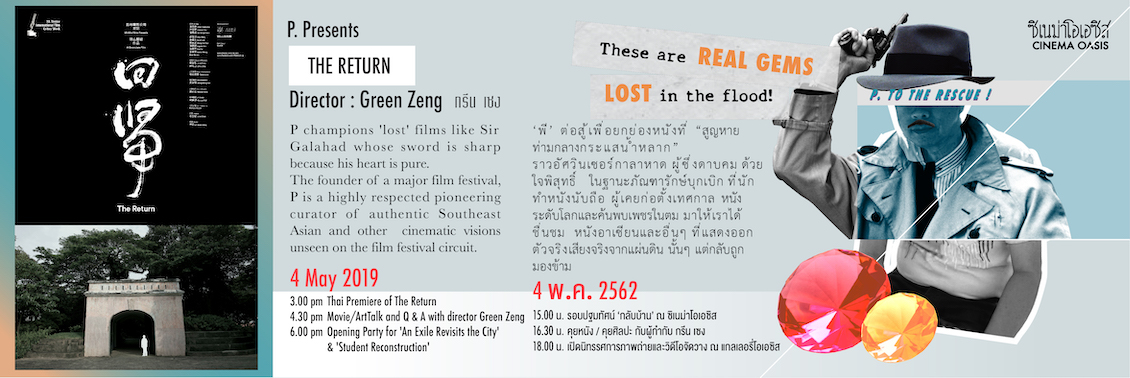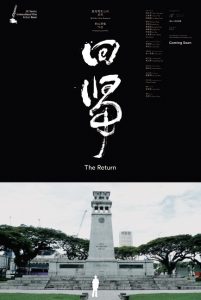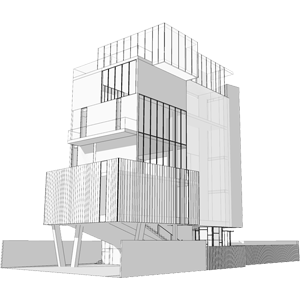The Return : Director’s talk (Clip)


The Return
83 min, Singapore / 2015 / In Mandarin, English & Malay with English Subtitles
The sea is Singapore’s fortune, and it’s the first thing we see, dark water lit by neon: blue then green, gold and black tinged with red, encapsulating the city state’s rise and strange metamorphosis. A young man writing at his desk is arrested on an Internal Security charge, leaving his equally fresh-faced young wife behind. Into the same empty, spotless white government housing corridor an old man walks up to the same door and knocks. The young father has returned from prison as an old man, to be greeted by his middle-aged daughter. Returning home drowns him in memories he never had, the years he missed in the flat ticking by, the sick wife he never got to nurse or to mourn, all because of his stubborn refusal to sign a false confession, unlike some of his friends.
The sound design as well as the wide panoramic shots are sensitive and extraordinary: the soundscape of the artificial landscape of the new Singapore, its constant note the drone of passing cars on the expressways that dissect the island. Not a roar of traffic and human (and sometimes animal) interaction like in Bangkok or Mumbai or laced with sirens like New York, but a constant whine and hum of cars rushing by—rushing by with no interaction, no stopping. Lee Soon Wen sits alone at his small dinner table with windows open behind him with a view of other housing towers. It’s hard to swallow the food. The soulless sterility of modern Singapore is here achingly captured in a wordless scene. The same composition recurs throughout the film, and always, always, the drone of the highway.
There’s a story of reconciliation with his embittered Christian son but what remains to haunt us are such mindscapes of Singapore: like a time traveller he gazes on the Marina Bay skyship and the whole fantasia that’s sprouted while his life was taken from him; an underpass for cars that has replaced the old National Library; Malaysia across the water “so near and so far”; his old school now become the Paranakan Museum; the old university gate from 1955 “so strange all by itself”, separated from the actual university by yet another expressway; the posted signs warning “State Land. Enter at Your Own Risk”.
On a guided tour through the “2 sq. km of primary forest left in Singapore”, he stays behind as the group rushes off to see the oldest tree in Singapore. Standing still, he closes his eyes and surrenders to the deep peace of this remnant of the land’s soul, coming to terms with his fateful decision to put his country above his personal life.
The last such mindscape is also the most effecting. Back on his favourite walk opposite the shores of Malaysia, he stands at sunset by the railing that runs the length of the shoreline, like the bars of a cage. The whole of Singapore is a prison, he realizes, and walks away out of the frame. Only the metal bars remain as we fade to black.
There’s a wonderful scene of him catching news of the ‘inexplicable’ riot in Little India on TV in a convenience store. 400 people overturning cars “like scenes from a movie”, says the TV, adding, “This weekend the government has announced a temporary ban on the sale of alcohol.” Snorting with disgust just as we do when faced with such lame banality, he swears and walks away.
But for all that, “This is my home,” he tells his daughter decisively; he cannot move to London with her. He marvels at the new passport obtained for him, but even internal exile and alienation are more endurable than abandoning his homeland, however badly it has treated him. “No, I cannot go” is emphatically not the same as “I will not go.” Once again he has chosen his country over his family. But any heartbroken but incurable idealist would agree that this is not a question of choice. (Alice Skinhead)
Director: Green Zeng
Screenwriter: Green June
Editor: Zeng Ming Shan
Cinematography: Wong Meng Fye
Production Design: Yeo Lee Nah
Music: Richard Cooper
Sound Design: Takuya Katsu
Producer: June Chua
Main Cast: Chen Tianxiang, Vincent Tee, Tan Beng Chiak





